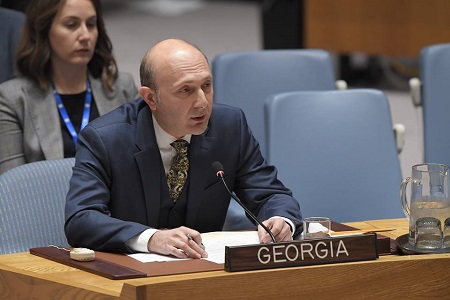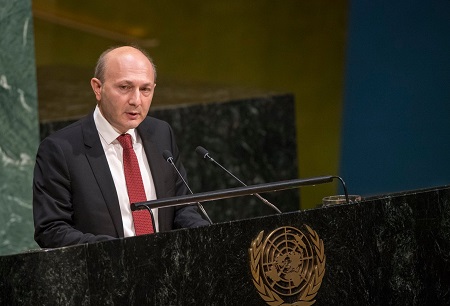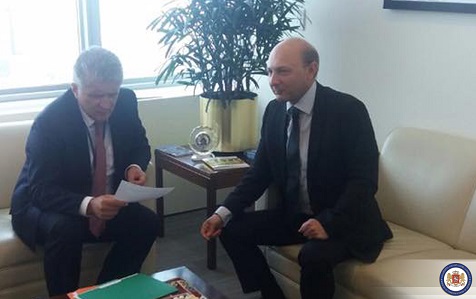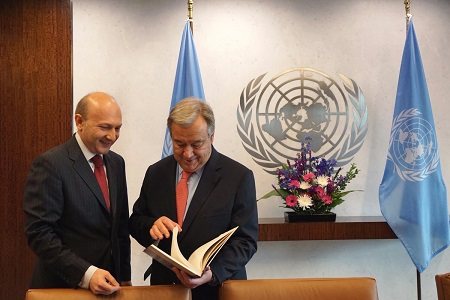Georgia’s Permanent Representative to UN calls for urgent need for int’l peacekeeping missions in occupied regions

Georgia’s permanent representative to the United Nations (UN) Kakha Imnadze has participated in the United Nations Security Council open debate on ”Collective Action to Improve UN Peacekeeping Operations”.
Stressing that while Georgia never enjoyed a peacekeeping operation with a full-fledged mandate, the United Nations Observer Mission in (UNOMIG) has played a crucial role in achieving security from 1993.
At #UNSC, recalled #UNOMIG blocked by Russian veto in 2009 & Aug.12 ceasefire agrmnt violations by Russia, grave #HR situation in occupied #Abkhazia/#Tskhinvali regns, arbitrary/brutal killing of civilian #IDP#ArchilTatunashvili, called for need for Int'l Security Arrangements pic.twitter.com/68vu6vC9vx
— Kaha Imnadze (@kahaimnadze) March 28, 2018
Imnadze said as in 2009 the UNOMIG was discontinued due to the veto casted by a Permanent Member of Security Council, which created a very dangerous precedent in UN history.
The forceful termination of the mandate, preceded by the cessation of the OSCE mission, created a total vacuum of international presence in the occupied territories of Georgia, thus creating the black holes for human rights and as observed by the UN High Commissioner on Human Rights - "one of the most inaccessible places on earth”, Ambassador Imnadze said.
Giving the example of the tragic death of "a Georgian civilian and internally displaced person” Archil Tatunashvili in Russian occupied region of Tskhinvali (South Ossetia), Imnadze said the Russian occupation has turned Georgia’s Abkhazia and Tskhinvali regions into territories where murder and torture are unaccounted for.
This situation speaks to an urgent need for creating international security arrangements on the ground, as provided by the EU mediated 12 August 2008 Ceasefire Agreement between the Russian Federation and Georgia”, Imnadze said.
He said the progress or even a meaningful discussion on the creation of international security arrangements in the Georgian occupied regions remains elusive, while in the Council the primacy of politics does not allow for the creation of a much needed peacekeeping mandate in the conflict affected territories, where the host country is deprived of its ability to exercise jurisdiction.
At @UNSC open debate on ”Collective Action to Improve UN Peacekeeping Operations" @kahaimnadze PR of #Georgia spoke on the need of International Security Arrangements in Georgia's #Occupied regions pic.twitter.com/K1JKe9TV3f
— GeorgiaUN (@GeorgiaUN) March 28, 2018
- Russia recognised Abkhazia and the other Georgian breakaway region of Tskhinvali region (South Ossetia) as independent countries after a military armed conflict with Georgia in 2008.
- As of today, only four countries recognise Georgia’s breakaway regions as independent republics; these are Russia, Nicaragua, Venezuela and Nauru.
 Tweet
Tweet  Share
Share





